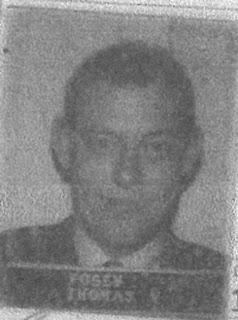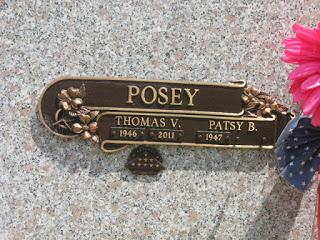
Thomas V. Posey: The right-wing terrorist
that Doug Jones defended.
Jones provided criminal defense for Thomas Vincent Posey, a Decatur, AL, man who founded Civilian Military Assistance (CMA, later called Civilian Material Assistance) and faced a series of weapons- and theft-related charges in the late 1980s and early 1990s. From a 1987 United Press International (UPI) story:
A lawyer for Tom Posey, the conservative Alabama activist accused of shipping arms to the Nicaraguan rebels with the help of a White House liaison, said his client would rebut the allegations in a meeting today with the Senate staff investigating the Iran-Contra scandal.
Posey acknowledges working with the liaison, Robert Owen, but denies any involvement in weapons shipments to the Contras at a time when U.S. military aid to them was illegal, according to his attorney Douglas Jones.
Posey has maintained in interviews that his organization, Civilian Military Assistance of Decatur, Ala., included no weapons in shipping tons of boots, medicine and clothing to the Contras since the ban on military aid was imposed in 1984. The ban was lifted last year just before the Iran-Contra case broke.
Jones said Wednesday that Posey kept in his house caches of weapons sent by private contributors but did not forward them to the Contras because he 'knew it was against the law.' Jones said his client would dispute the allegations against him in talking to the Senate investigators today.
Did Jones help keep Posey out of trouble with the feds? The answer, based on published reports, is "sort of." A 2011 Newsweek article, titled "My Life as a White Supremacist," focuses on an FBI informant named John Mathews, who palled around with Posey and other anti-government types. From the Newsweek article:
Matthews, an ardent anticommunist, had long run in extremist circles, but an event in September 1990 opened his eyes to the dangers posed by the far right. It happened at a Las Vegas conference honoring Soldier of Fortune, a magazine popular with mercenaries and weapons enthusiasts. He went as a bodyguard to a Nicaraguan commander, and like many of the gun-toting men who gathered there that weekend, loved his country but hated his government: the economy was in tatters, the first Iraq War was imminent, and President George H.W. Bush was talking about the “New World Order.”
At the conference, Matthews spent the mornings in seminars about surviving a government collapse and the afternoons firing automatic weapons at a local range. At night, participants gathered to play blackjack and talk politics.
One of the men Matthews hung out with that weekend was Tom Posey, the head of an American paramilitary group, once thousands strong, called the Civilian Material Assistance (CMA). In the 1980s, CMA, with encouragement from and the tacit support of the National Security Council and the CIA, had trained and armed anticommunist rebels in Nicaragua. (Ronald Reagan reportedly called Posey a “national treasure”; Oliver North, then a member of the NSC, hired a liaison to work with the network of private soldiers involved in the conflict, including the CMA.) After the war in Nicaragua ended, politics would quickly turn against Posey: as news spread that the U.S. had used networks of private soldiers to arm the contras, Posey was indicted for weapons smuggling. Though he beat the rap, he was stuck with considerable legal fees and a feeling, according to friends, that his government had hung him out to dry.
Posey beat the rap on weapons-smuggling charges, he was not so fortunate a few years later. From Newsweek:
At the behest of his FBI handlers, Matthews—a wire often down his pants and a pistol in his shoulder holster—traveled across the country with Posey and others, attending dance parties with the Ku Klux Klan, selling weapons at truck stops and gas stations, sitting in church pews with would-be abortion-clinic bombers, and becoming a regular at gun shows and in paramilitary compounds. Extremist leaders were his frequent guests, sometimes staying the night, and hosted him when he traveled from home. “That’s how well trusted I was. We was one big happy family,” Matthews recalls. . . .

Doug Jones
As Matthews was soon to learn, the FBI layered covert intrigue upon covert intrigue. In early 1992, Matthews says he and Posey traveled to Austin, Texas, to meet a former Klan leader and suspected member of a locally based paramilitary group, the Texas Reserve Militia (TRM). The FBI was investigating the TRM for allegedly laundering money through a Texas gun shop, paying off local law enforcement, purchasing stolen weapons from a military base, attempting to blow up a National Guard convoy in Alabama, and threatening to kill two FBI agents.
The suspected TRM member brought along a Vietnam veteran called Dave, an unremarkable-looking man in a green bomber jacket, fashionable among skinheads at the time. Matthews recalls that they met in a small, musty hotel room on the outskirts of the city, and for a few hours kicked back and talked about the movement. Posey went on about the New World Order, which to extremists like him meant the threat of global takeover by an assortment of international organizations including banks, the United Nations, and other elite institutions. Dave said he was the leader of a group of armored-car robbers who were using the proceeds of their exploits to fund the movement. “We were feeling each other out,” Matthews says. “[Dave] let us know there was money available."
"Dave" proved to be an undercover FBI agent, and that would heighten Posey's legal problems. First, Posey sold "Dave" military-issued night-vision goggles (apparently stolen). Posey boasted that he could get "Dave" several Stinger missiles, worth $40,000 apiece. And Posey revived a plan to rob the Browns Ferry armory in Alabama and take out gas and power lines nearby.
On Sept. 9, 1993, FBI agents arrested Posey on charges related to the Browns Ferry plot. That led to a trial, with Matthews involved:
After Posey’s arrest, the FBI had Matthews’s Social Security number changed and paid for him and his family to move to Stockton, Calif. They also flew him to Montgomery, Ala., for Posey’s trial. Despite hundreds of hours of recorded conversations, as well as video and personal surveillance, the district attorney’s office had chosen to prosecute Posey and his cohorts only for buying and selling the stolen goggles. A spokeswoman for the U.S. attorney’s office in the Northern District of Alabama said there had been insufficient evidence for anything else. . . .
The prosecutor questioned Matthews on his dealings with Posey and Dave and the sale of the goggles. He played several recordings that backed his account. And then Matthews stepped off the stand. The FBI agents escorted him out of the courtroom the same way he came in. Hours later, he was on a plane back to Arizona. In the end, Posey was sentenced to just two years in prison and fined $20,000.
Thomas Vincent Posey died, at age 65, on July 19, 2011. He faced serious criminal charges during his life, and it's likely he would have died in prison without the assistance of Doug Jones -- who now seeks to ride the support of black voters to a seat in the U.S. Senate.

Thomas V. Posey grave site at Roselawn Cemetery
in Decatur, AL
Doug Jones is a KKK-fighting Democrat? The author of that 2017 article could have looked six years back in Newsweek's archives and found that Doug Jones has a record of defending a right-wing terrorist with ties to the KKK. That case suggest Doug Jones protects KKK members and like-minded bigots.
Does that poke a few holes in the notion that Doug Jones is a civil-rights icon, deserving of support from black voters? It sure as heck does.
